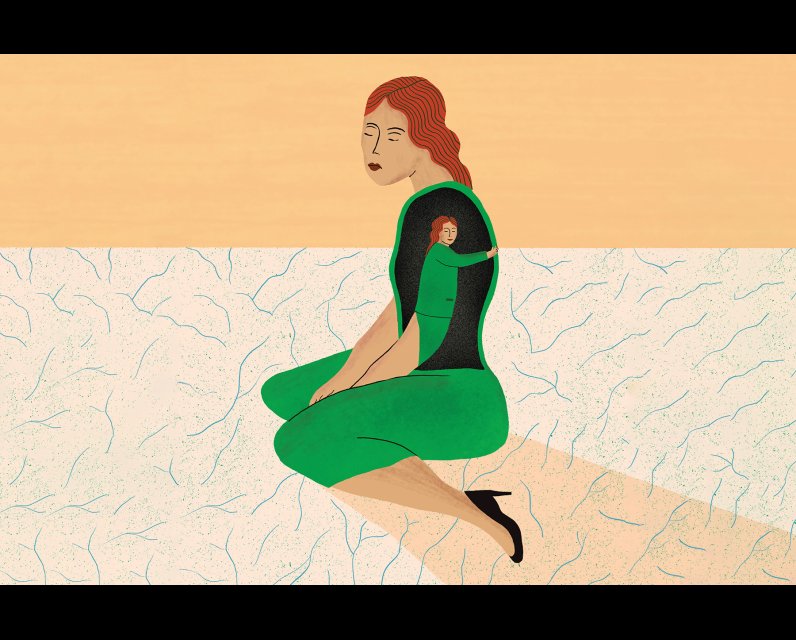The Green Suit

Rowan bought the green suit right after her miscarriage. She’d gone on a twilight walk, her eyes scanning the ground, the sky, the other pedestrians for solace, when the suit caught her attention. It glowed from the store window. A bright, emerald shout of confidence, the colour of life itself, a promise that things would get better. She purchased the suit then and there, wore it out of the store, and had kept it on ever since.
It is rare enough to find an item of clothing that fits well, looks great, and is made to last. Rarer still to find one that, mysteriously, all but cured her of her blues. The suit sat close to her skin, and in its viscose-blend hold, she felt secure and free. Its elegant tailoring projected to the world an image of a person who was keeping it together, concealing the fact that she was in tatters.
It was important to maintain the green suit. At first, she brought it to the dry cleaners on the corner. They were very good. She’d brought hopeless items of clothing there in the past, and when she’d retrieved them, she’d been astounded at how crisp they appeared, like new. Now she paid extra for the one-hour service so she wouldn’t have to be without the suit for long. While she waited, she went across the street and drank a coffee and read a book at a cafe, glancing at the dry cleaners now and then to make sure it didn’t burn down.
But then one day, she came back after the hour was up and they couldn’t find the suit. The owner suggested she come back the next day, he would surely have found it by then. She refused, and waited until he at last discovered the suit hiding behind a fur coat, returning it triumphantly to her sweating, trembling hand. She didn’t bring the suit back to the dry cleaners after that. She spot-cleaned it instead, coaxing a coffee stain out of the fabric with baking soda and hydrogen peroxide, brushing dandruff from the collar, charming the smell out of the armpits with a spritz of deodorant. If the suit lost a button, she replaced it. If she couldn’t find the precise button to match, she replaced all of the buttons to preserve their uniformity. Out trundled old skills she hadn’t had to use for a long time: threading a needle, knotting the ends of the thread, poking through the fabric without pricking her thumb. Who had taught her this? She couldn’t remember, but the sewing itself was in her muscle memory. A skill she’d hoped to pass on, but, well.
Being able to perform these small tasks helped her to feel that she was still a human being. After the miscarriage, she had dropped the daily chores of personhood one by one, because she couldn’t be bothered, they all lacked meaning. Clean the house, why? Tune into her online book club, for what? Eat dinner with her husband, Avi, and their friends? None of it appealed.
There was work. Work she could do, because the habit asserted itself even on her worst days. For several years, she had been a copy editor at a large publisher downtown. She looked up words to make sure the author had the meaning right. She corrected grammar and formatting. She did her job well, but it wasn’t very important. In the early days, she’d gotten some enjoyment from learning something new every day. Once in a while, she found herself temporarily an expert on a niche topic such as how to build a fieldstone retaining wall or the most beautiful hikes in France. When none of this was of any use to her, however, she eventually stopped absorbing what she read and focused on excising the errors she saw, turning her brain into a tool that didn’t retain any traces of use. Like cheesecloth, which coddles the cheese and discards the whey and then is rinsed, wrung out, and used again without any nutrients remaining from what it once contained.
Before she started wearing the suit, human resources called her in one day for crying in the bathroom. That was the official reason as told to her by Ingrid, the sympathetic young woman in the white blouse and dark pants seated across the desk.
“On more than one occasion, you’ve been heard crying in a stall. Crying loudly.”
Rowan, who’d become familiar with the employee handbook when she applied for bereavement leave and was told that it only covered immediate family members and not pregnancy loss, knew that crying in the bathroom wasn’t restricted, and said so.
Ingrid tipped her head to the side, conveying work-appropriate concern.
“I just want to be helpful. What would be helpful to you?”
“A pass to the executive washroom so I can cry in private.”
Ingrid’s face went carefully blank.
“When I feel the need to cry in public,” Ingrid said, “I do it quietly, like this.” She mimed her quiet crying method, snuffling rhythmically behind her hands. “It lets me cry all I want without disturbing other people.”
“Thank you. That’s very helpful. I’ll give that a try.”
But since she’d had the suit, Rowan didn’t feel the need to cry in the bathroom anymore. She just did her job, occasionally brushing her sleeve against her cheek for the comfort of its softness.
To be in pain and have people not see it—to be at fault for them not being able to see it because of a forcefield of learned courtesy—was untenable, laughable. It was a major shortfall of the prevalence of the wellness industry that a person couldn’t fall apart anymore. Not like you used to be able to. In the olden days—so she pictured them—she could have gone fully loony, in the true sense of the word, as in, derived from “lunar,” as in, relating to the menses. The medics would have labelled her hysterical—another good word, relating to the uterus, the source of her current troubles—and locked her up in an asylum with the other maniacs. There, she could have given her urge to wail and wretch and rend her garments full reign until she was drained of grief. At times, this daydream was more attractive than the modern help available to her through this crisis, which was only a minor crisis in the hierarchy of traumatic events. Even she had to admit that. So, pencil in a support group every Thursday night. Partake of regular exercise. Try an antidepressant, or, if that seemed too extreme, just take some vitamin D instead.
Her colleagues, with whom she had pleasant though superficial interactions, hadn’t commented on her brief sick leave or period of gloom, but they behaved noticeably warmer toward her once she started coming to work in the green suit. Her husband, too, was at first relieved to see her in something other than sweatpants and the bathrobe she’d been wearing around the house.
“You look gorgeous,” Avi told her.
“Ah,” she replied.
She did, it was true, with her hazel eyes and carnelian hair set off by the hue of the suit, look gorgeous. Gorgeous, another word that, when dissected, had a different meaning than one would think. She used to think it came from “to gorge,” meaning “to eat.” Meaning, she looked edible. But actually, it came from the French “la gorge,” referring to the throat or bosom, the adjective denoting something so beautiful you want to hang it around your neck. The verb to gorge came from the same word, but referred to something that has been swallowed, engorging the throat—it was all a big mess, etymology, really. She needed to stop thinking about it and get a real hobby.
Avi had hobbies, healthy ways of managing his heartache, like refinishing furniture in the garage and swimming at the Y at ten o’clock at night, tiring himself out before facing that abyss of thought one has to cross to reach sleep, not to mention the awkward reproach of their bed.
“Are you wearing the suit to bed again?” he asked every night.
Yes, she wore the suit to bed. The first few nights, he wrapped her in his arms regardless, but inch by inch she moved away, a little more each night, until he got the point. She didn’t need to be hugged further; the suit did that well enough.
Human Resources again.
“Some of your colleagues have noticed that you’ve been wearing the same clothes for several weeks in a row.”
Rowan didn’t have a ready response to this and sat speechless while Ingrid waited patiently. It seemed they would sit there forever, if necessary—no, probably only until five. They would go home and resume the next morning so as not to incur any overtime.
Or perhaps Ingrid did have her best interests at heart. Rowan imagined pouring her heart out right then and there, the whole dark icky sac of blighted hope. She opened her mouth. At the same time, so did Ingrid.
“I stick to a capsule wardrobe as well. And do you want to know a trick I’ve found? If you want to wear the same outfit all the time without anyone noticing, mix it up by adding an accessory, like a colourful scarf.”
She touched the patterned scarf at her neck. It was then that Rowan realized Ingrid was wearing the same white blouse and dark pants she’d always seen her in. The trick worked.
“Thank you. That’s very helpful. I’ll give that a try.”
She went back to her desk and, for the millionth time, looked up the definition of the word “miscarriage.” Other than how it pertained to pregnancy, it was a very bland word. To carry something poorly. A mistake, an error. A going wrong.
That night when she undressed, she noticed something strange. Her skin at the wrists and the waist, as well as around her neck, had acquired a green tint. And the suit itself felt a little sticky. She had trouble pulling it off; it clung to her legs, stripping her of the fine hair on her calves. Almost like the weave was melting into her body. Cheap fabric. She couldn’t believe it. The next day, she skipped work. Wanting to unload her anger on the shopkeeper who’d sold her the suit, she went back to the store.
But, like a moment out of a fairy tale, the store was no longer there. Or, more likely, she simply couldn’t find it. She’d been in a shambles the day she found the suit. She remembered trying to pay with a coupon from the bakery she and Avi went to on weekends, two scones for the price of one. Her fingers tripping as she searched through her wallet for a credit card. The kind face of the cashier telling her to take her time. She remembered shedding her old clothes and leaving them behind in the fitting room like unwanted skin.
During her search for the store, it began to rain. The shoulders of the jacket seized, clinging to her for warmth, and she hurried home and decided to stay there. She called into work and told HR that she wouldn’t be in for the foreseeable future. There was a sigh on the other end of the line, an intake of breath as Ingrid was about to speak. Rowan hung up the phone. She didn’t want any more tips or tricks.
She picked up where she’d left off right after the miscarriage, that is, coiling up in bed and weeping until her mind became grey space. A vacuum in which no desire existed. Desire was the source of all disappointment. “Desire,” which could mean, in different contexts, “to long for,” but also “to demand” or “to expect,” which to her seemed like coming at a thing from opposing positions, one of them deserving, the other undeserving. Which was she?
Avi came in and sat with her for a long time. Then he went away. At some point they had agreed on an unspoken arrangement by which they gave each other space to grieve, but now she thought this was a mistake. It established no boundaries to her sorrow, nothing for the sadness to crash against and recede. The suit contained it to some extent, but now the suit was also failing her, and she couldn’t wear it forever.
She slept. She got up briefly in the night, overly warm, and removed the green suit, carefully arranging it on the chair. In the darkness, it looked like a reclining person.
When she woke up, the bedroom was bright and crystalline. Something had shifted—she felt a change. Even the ceiling looked different, higher, less oppressive. She marvelled at this phenomenon until she realized it was the same ceiling, she was only looking at it from a different angle. How had she ended up in the chair? She remembered getting up in the night to take off the suit, and then—
God, she couldn’t move. Her limbs were boneless, like fabric. They were fabric. She was in the suit still—no, she was the suit. She tried to panic, but her adrenal gland was now a pearl button. She felt for her heartbreak of before, but it was missing. Instead of a heart, she had a breast pocket where a handkerchief could go. Her brain, too, was gone, but she still had a sort of consciousness that hovered vaguely near the label tacked to the collar of the jacket. There was a satisfying click of recognition of her new form, in the green suit. It wasn’t what she had desired, but it fit. However, she couldn’t tell whether she would fit, now, into her old life.
From her position on the chair, she strained to observe how Avi was handling her transformation. Her heart went out to him, or it would have if she still had one. Losing his wife so soon after losing a baby. Maybe he would figure it out, find a way to turn her back into flesh and blood. She only saw him in snippets that day, walking past the open door, zipping in once to get a change of socks. He didn’t appear to be distraught, but it was possible he hadn’t noticed anything was wrong yet. When she didn’t come home for dinner, he would go into emergency mode, call the office, call the police and, with any luck, follow her scent back to the jacket. That night, though, she sensed no distress emanating from the rest of the house. Avi didn’t come to the bedroom even for a cursory look around.
After dark, he at last entered the bedroom, accompanied by another woman. The sight might have had her blood boiling, but her veins were green thread. This woman, whom she felt she ought to know, went about the room as if she owned it. After pawing through the dresser, she stepped lightly into a pair of silk boxers that Rowan hadn’t worn in months. She disappeared into the bathroom and came out smelling of Rowan’s toothpaste and face cream, her forehead glowing, carnelian hair piled up on her head. She sank into the bed, into Avi, like she was used to seeking comfort there.
All night, Rowan watched her sleep peacefully, and by morning, she and this familiar mirage had come to an understanding. When the woman, the next day, took the green suit to a consignment shop and went on her way, Rowan didn’t hold it against her. She drew breath into her fibres to make them gleam, and hung gracefully on her hanger, anticipating the thrill when a shopper chose her from the rack and tried her on. She would lay her lapels protectively over the heart of whoever wore her next. She would strengthen her seams to help hold them together, if that’s what they needed. She’d widen her pockets and whatever went in them—shame, loss, secrets, lint—she would carry.
The post The Green Suit first appeared on The Walrus.


Comments
Be the first to comment